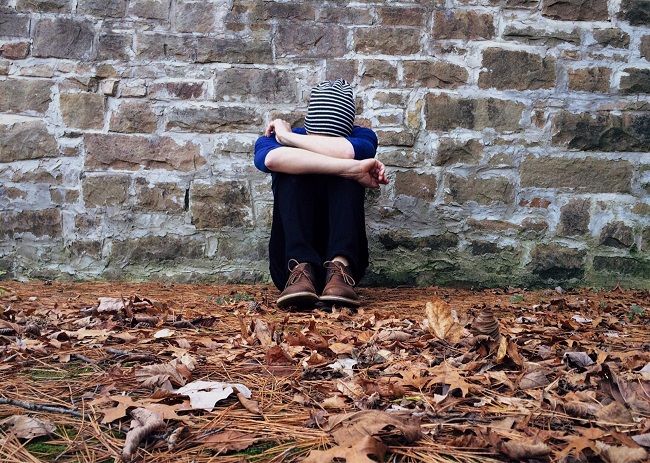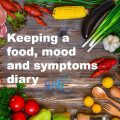Thanks to my friend Andy for sharing this link to an article from the Guardian, “Is depression a kind of allergic reaction?”, which explores recent research and the views of many scientists who believe that depression is increasingly a result inflammation caused by the body’s immune system.
New research has discovered that some depression is caused by an allergic reaction to inflammation in the body.
My low mood is linked to inflammation in my body
I have long suspected that this might be the case since low moods plague me when inflammation is out of control in my body. I’ve written a number of blogs about this and having allergies and eczema, both of which are inflammatory conditions, this has been something I have battled with throughout my life.

Read “Stress and depression, the allergy link” here.
I am convinced that certain foods trigger not just an allergic reaction but depression, which miraculously lifts when the reaction passes.
Could this mean a cure for depression?
This is incredible news for anyone who has depression; the article suggests a cure for depression could be just five to ten years away. If we can pinpoint what is causing inflammation in a person, can we cure depression for good?
The article was called – New Research discovers that depression is an allergic reaction to inflammation.
Has anyone else experienced this? It’s more than just feeling down that you are reacting. This is something else and when I’ve questioned experts they don’t really have much to say on the subject. The impact on the wider depressed community could be huge – no more drugs, just try to reverse the inflammation! Though I suspect that is easier said than done if my journey to discovering which foods trigger my severe and mild problems is anything to go by.
Depression and mental health
The labels ‘depression‘ or ‘mental health‘ are still not widely understood or appreciated by many unless they have experienced it themselves or know someone who has had to work through it.
As a nation we don’t view mental health issues very kindly. We are encouraged to ‘pull our socks up’ and ‘just get on with it’. Many think it’s all in the mind – which is exactly where it is, but we’re not making it up. When your mind takes over you know you need to somehow get out of the thinking, the rut, the endless pain of it. Sometimes you can’t just snap out depression, because it just never goes away. There doesn’t seem to be a reason for it often, you look at your life and see all the many things you should be thankful for and achievements you have made and still feel like crap. So what is causing it?
Depression and chemical reactions in our brain
We know that it has something to do with chemicals in the body which affect how our brains and minds function, but what is that reaction was triggered by eating certain foods? What if these reactions were different for everyone and not random at all but caused by food allergies?
I’ve written about this exact subject before because I KNOW that when I have an allergic reaction or an immune response to something my mood just nose-dives. When I have had anaphylaxis there are feelings of impending doom, feelings of guilt; was it my fault? how could I have avoided the reaction? Might I have died if I hadn’t used adrenaline? or would I have been OK anyway even without adrenaline? How serious are these reactions? The not knowing how your body with react on any given day is terrifying and when you are having an anaphylactic reactions things can move incredibly fast, from feeling a little nauseous and wheezy to full blown throat swelling.
Depression always follows anaphylaxis
Less severe reactions leave my skin swollen, itching and painful it does make sense that I’m going to feel pretty rubbish but it’s more than that. It’s like my whole brain can’t cope, cannot see that this will pass, that I will get better. Instead I go into a complete hole of pain: I don’t eat – not a thing, I’m not even hungry. It’s as if I’m scared of eating anything at all. It’s weird because I usually have a good appetite, though not huge, and eat breakfast, lunch and tea. When I’m reacting to something I don’t want to eat anything. I don’t want to see anyone or do anything. I just want to hide and not take part any more. It’s horrible. Though thankfully infrequent these days now I’ve worked out what foods are causing me problems, when I have a reaction, even though I know how long it usually takes to heal I cannot lift my mood.
Food and depression
I am convinced there is a food connection, for me at least. When I’m eating my processed food free diet (I’m back on it again now) my health just gets better and better. I am happy, productive and want to see my friends, enjoy my work and love getting outside to nature and exercising. When certain food gives me a problem, which can be anything from a swollen burnt allergy face to anaphylaxis, I am the opposite; a miserable, mean minded, slob who is not much fun to be around. A full on anaphylactic attack knocks me out for days, it exhausts me and I don’t feel right for some time. The less severe eczema and stomach problems some of my other allergies give me are delayed reactions which trigger more depressive and lower mood symptoms.
Why don’t doctors ask about diet and lifestyle?
How many doctors seeing a patient presenting with depression discuss their diet and exercise with them? This should be the FIRST thing they talk about and more if not just as important as any medication.
In the article George Slavich, a clinical psychologist at the University of California in Los Angeles, says ““I don’t even talk about it as a psychiatric condition any more. It does involve psychology, but it also involves equal parts of biology and physical health.”
It discusses how our body’s reactions when we are ill makes us feel awful to force us to stay in bed and recover. If we didn’t have those feelings of lethargy, sickness and boredom, unable to move, get up and get working again we might not heal very well at all. It’s normal, so what if depression, long term and constant for some people, was caused by an allergic reaction? They feel constantly unwell, but not in the way we recognise allergic reactions with hives, wheezing, throat swelling and nausea. Until you address what might be causing it you’ll never start to really feel better. No amount of anti-depressants will ever get to the bottom of the problem, merely mask the symptoms, and cause side effects which may also be hard to live with.
Changing the way we view depression
So is there any truth in this? Could it help the way we view depression and mental health issues? Are certain foods causing the depression symptoms and how are people supposed to find out about this? Will it help lift the stigma of depression if we admit that it’s a physical reaction to something rather than just a weakness or chemical malfunction in the brain, which we can’t really understand or prove or solve.
If some people’s views and understanding of allergies is anything to go by I would question whether this diagnosis would help things at all. You can read my latest Allergy Diary on Foods Matter about comments about the BBC coverage of the new allergen laws that will affect restaurants here.
The more stressed a person feels, losing sleep, eating badly and sinking into lower moods of anxiety and depression, this affects the immune system.
Can oxygen therapy help relieve depression?
I am having weekly oxygen therapy at the moment which is proven to help with inflammation and healing so perhaps this is also keeping my body in check; it has certainly had many benefits, not least a reduction in IBS symptoms, nodular prurigo, itching and insomnia. Right after a session I always feel amazing in myself, I have far more energy and feel so much more positive since having oxygen treatment. Could there be a link? Could the reduction in inflammation that the oxygen provides be boosting my immune system and so improving my mood and lessening the chances of depression?
What do you think? Is there a link between depression and allergies and is depression a kind of allergic reaction?












The first target of allergy is the brain.Have a read of Dr. Diana Samways book,’ I’m a patient get me put of here’, in which she describes the devastating effect of mould allergy from which she and I suffer. My husband years, ago always wondered why I became so unhappy in August. This is the beginning of the mould season. I have learnt to control it with the help of immunotherapy from Banstead, but after visiting our church for our carol service, just before Christmas, churches are notoriously mouldy, I lost my voice and spent Christmas morning in tears while the family went to church.
Hi Jacquie, I too react to mould spores, nightmare really because you can never really ever totally escape though you can make your house as dry, safe and healthy as possible. I haven’t read that book, I’ll have to look it out. Love the title! Sorry to hear about your Christmas morning aborted visit to the church. Not great! But I agree, I think that allergy definitely affects the brain though doctors will never discuss that with you.
This reminds me of my first ever patient: a lady with severe depression and I said I couldn’t help her as per my training. She begged though and so I just said I would help her general health. I took her off wheat and dairy and did the standard liver and gut detox and both she and I were shocked at the difference in her mental state within 3 weeks. Taught me a lesson. Always investigate allergy/intolerance with mental health. In fact, Pfeiffer in the 50s called the issue ‘brain allergy’ I believe. Most gluten sensitives of course have neurological issues rather than gut, in fact, and that includes anxiety and depression.
Hi Micki, just typed up a whole long reply, hit a key and it all went, just like that. Poof! So here is a shorter one. Thanks for the comment. I’m staggered at how quickly your patient saw an improvement – it’s almost shocking. Most British people have a diet rich in dairy and wheat, we have bread for breakfast and lunch and often tea too. If that is causing depression what on earth can you do? No amount of treatment will help if you don’t address that food trigger. I do wonder how good the freefrom gluten free breads, cakes, biscuits etc. are for people – while they are better than me eating wheat which destroys my gut, I do get side effects when I eat any processed foods. I think it’s some kind of preservative or mould inhibitor but it causes itching and nodular prurigo and general IBS. Back on the processed food free diet again for me. I pretty much was anyway but with a few lapses. Not worth it. Why don’t doctors speak to people with depression about their diet? Frustrates me.
Yes, I remember standing up and telling a load of food manufacturers (Michelle will remember no doubt!) that they had a fabulous opportunity to really help people’s health when manufacturing GF/freefrom foods by making them healthier alternatives rather than full of processed stuff, other common or developing allergens and additives. I think it probably went down like a lead balloon, but in fact one of the attendees came up to me afterwards and said their table wanted to stand up and cheer after my talk but daren’t!